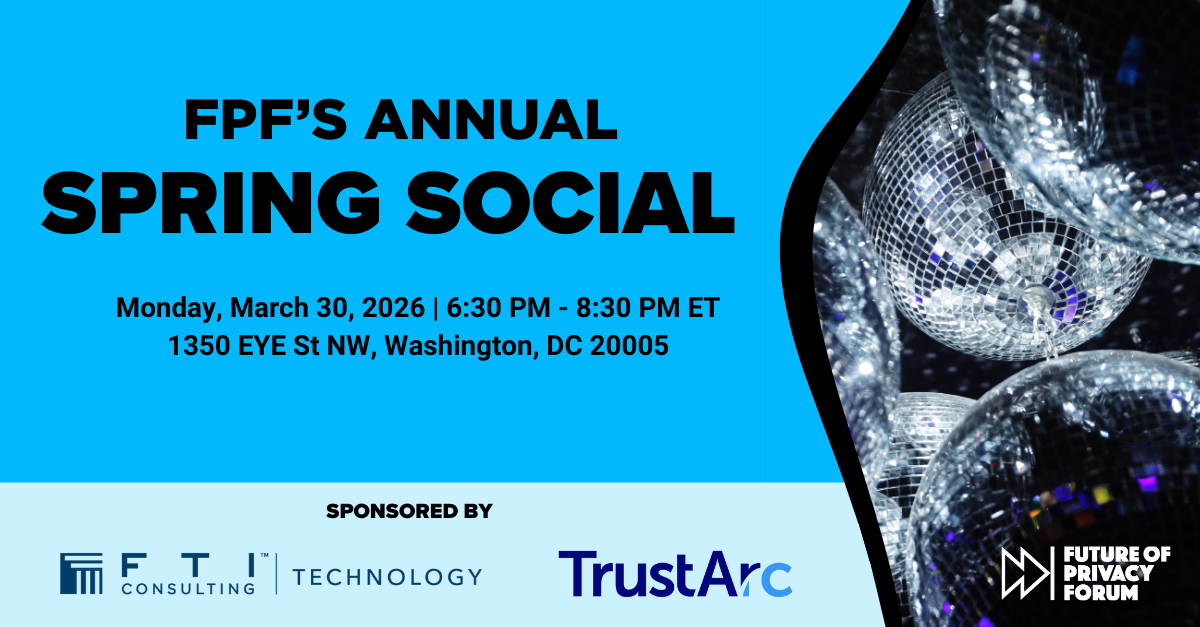Showing results for fire2020 20init free promo code india theakston fire2020 20init

FPF’S Annual Spring Social
FREE – Registration Required (Invite Only)

FPF Nasscom India AI Impact Summit Web Header 2880×1500 v1
fpf nasscom india ai impact summit web header 2880×1500 v1

FPF Year in Review 2025
[…] an overall generative AI system. This fall, the Center hosted the “Responsible AI Management & CRAIG Webinar”, exploring responsible AI and the role of industry-academic research in promoting responsible AI management. Guests from the recently established Center on Responsible AI and Governance (CRAIG), the first industry-university cooperative research center to focus exclusively on responsible […]

Abstract,Big,Data,Visualization.,Big,Data,Code,Representation.,Futuristic,Network
abstract,big,data,visualization.,big,data,code,representation.,futuristic,network

FPF Youth Privacy in Australia
[…] Future of Privacy Forum Jordan Wrigley Data and Policy Analyst for Health & Wellness, Future of Privacy Forum AUTHORS All FPF materials that are released publicly are free to share and adapt with appropriate attribution. Learn more . The Future of Privacy Forum (FPF) is a non-profit organization that serves as a catalyst for […]

FPF Anatomy of a State Comprehensive Privacy Law Report
[…] of State Comprehensive Privacy Law: Surveying the State Privacy Law Landscape and Recent Legislative Trends, November 2024, papers.ssrn.com/abstract_id=5309115. ACKNOWLEDGEMENTS All FPF materials that are released publicly are free to share and adapt with appropriate attribution. Learn more . B etween June 2018 and June 2024, nineteen U.S. states enacted comprehensive consumer privacy laws that […]

17th Annual Advisory Board Meeting 2026
[…] the year. While this Forum is open to the broader community, members are encouraged to attend, and each event will have its own registration. This event is free for FPF Advisory Board members. What to Expect When top experts in data protection convene from various corners of the globe, spanning diverse sectors such as […]

FPF AARNET Youth Privacy in Australia
[…] Future of Privacy Forum Jordan Wrigley Data and Policy Analyst for Health & Wellness, Future of Privacy Forum AUTHORS All FPF materials that are released publicly are free to share and adapt with appropriate attribution. Learn more . The Future of Privacy Forum (FPF) is a non-profit organization that serves as a catalyst for […]

Project Researcher, Privacy and AI Governance
[…] key jurisdictions. Coordinated from its headquarters in Washington DC, FPF has offices in Brussels and Singapore, as well as a network of experts and partners in Kenya, India, and Brazil, with a long term view of expanding our global presence. To develop its global perspective and contribute to the comprehensive understanding of privacy and […]

Comparison of COPPA 2.0
[…] use, and disclosure practices of the operator with respect to personal information ; and ( B) before the personal information of the child or teen is collected, freely and unambiguously authorizes — (i) the collection, use, and disclosure, as applicable, of that the personal information ; and 6 (ii) the any subsequent use of […]
